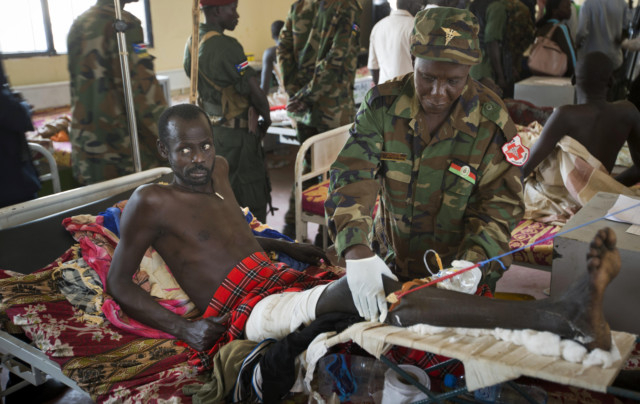
In 2011, the world’s newest nation was born amid joyous celebrations. The international community welcomed South Sudan not just with cheers but also with promises of help. The hope and promise of that day are now at grave risk of being squandered if the nation’s leaders do not at long last provide leadership.
Violence that erupted in the capital city of Juba last December spread quickly, claiming the lives of thousands of men, women and children, reopening bitter ethnic divisions. In the time since, almost two million people have been displaced from their homes, while residents in some parts of the country face the risk of famine.
In a country that has so much potential and that has endured decades of conflict, the violence has had a devastating effect.
The tragedy is especially hard to accept because the violence was not imposed on South Sudan by outside forces. Instead, it was unleashed by a political dispute among the country’s leaders. Now, the responsibility is on their shoulders to halt the bloodshed and bring their country together. After months of delay and false pledges, both sides must return to negotiations, make necessary compromises and finally end this conflict without further delay. Barren vows and rosy words are not enough; too many people have died while too many promises have been broken. It is past time for South Sudan’s leaders to take responsibility and end the fighting.
To move forward, a transitional government with a mandate to create security agencies that protect all of South Sudan’s people — regardless of ethnicity or political alignment — is imperative. That government must develop a transparent system for managing the country’s resources and agree on an inclusive constitutional drafting process that focuses on improved governance. Given the level of past violence, a reconciliation plan must also be established, accompanied by efforts to investigate atrocities and ensure that those involved are held accountable for their crimes.
The South Sudanese people have many friends throughout the world and none is more committed to their future than the US. But the full value of those friendships cannot be realised unless and until the country’s leaders put the interests of their people above their own grievances.
The US and its international partners have organised a massive humanitarian aid effort, supported a United Nations peacekeeping force, whose members have risked their lives to save civilians and made repeated efforts to encourage reconciliation and a return to peace. We have worked with local and regional partners to document human rights abuses and support religious leaders as they work for reconciliation. All this is helpful, but none of it will be enough in the absence of effective leadership.
Facing greater consequences
Working in close cooperation with its regional and international partners, America will continue to increase pressure on the parties until the violence ends. But we must also be clear that those who choose the path of continued conflict and destruction will face greater consequences.
We do not have the luxury of time. In South Sudan, hunger is often a threat, but when the cycle of planting and harvesting is disrupted, when grazing lands are turned into battlegrounds and when humanitarian convoys are subject to attack, the threat becomes a crisis and the lives of millions hang in the balance.
With each passing day, the ranks of the hungry and malnourished grow. This suffering will end only when the guns fall silent.
On this sad anniversary, we salute the men and women of South Sudan who still strive each day on behalf of peace. The two of us have travelled to South Sudan many times. We know the country’s promise and have seen firsthand the dedication, courage and incredible resilience of its people. We remember the long queues of voters standing and waiting with patient exuberance to vote in their country’s referendum and joined with the crowds on independence day to celebrate the realisation of peaceful self-determination.
Now, the whole world is watching to see what the leaders of South Sudan will do. Will they continue on the path of conflict and condemn their country to another year of suffering? Or will they make the hard choices, work together and restore to their country the hope that its citizens so richly deserve? For the sake of all the people of South Sudan, the choice must be for peace.
— Washington Post








